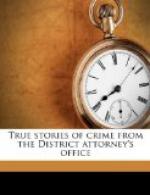One thing he observed and noted carefully—every man he knew who had begun a brokerage business and kept sober, who attended to business and did not speculate, made money and plenty of it. He knew one young firm which cleared up fifteen thousand in commissions at the end of the second year. That looked good to him, and he knew, besides, that he was sober and attended to business. He made inquiries and learned that one could start in, if one were modest in one’s pretensions, for two thousand five hundred dollars. That would pay office rent and keep things going until the commissions began to come in. He started to look around for some other young man who could put up the money in consideration of John’s contributing the experience. But all the men he knew had experience without money.
Then by chance he met a young fellow of bright and agreeable personality whom we shall call Prescott. The latter was five or six years older than John, had had a large experience in brokerage houses in another city, and had come to New York to promote the interests of a certain copper company. John had progressed and was now assistant loan clerk of one of the biggest trust companies in the city, which also happened to be transfer agent for the copper company. Thus John had constantly to handle its certificates. Prescott said it was a wonderful thing—that some of the keenest men in the Street were in it, and, although it was a curb stock, strongly advised his new friend to buy all he could of it. He assured John that, although he was admittedly interested in booming the stock, he was confident that before long it would sell at four times its present quotation.
Meantime the stock, which had been listed at 2-1/4, began to go rapidly up. Word went around the trust company that it was a great purchase anywhere below 10, and John, as well as the other boys employed in the company, got together what money he could and began to buy it. It continued to go up—they had unconsciously assisted it in its ascent—and they bought more. John purchased seventy-five shares—all the way up to 8 and 9. One of his friends took eight hundred. Then it dropped out of sight. They hadn’t time to get out, and John, in prison, has his yet. But he still had faith in Prescott, for he liked him and believed in his business capacity.
The stock “operation” over, Prescott began to prospect for something new, and suggested to John that they form a brokerage house under the latter’s name. John was to be president at “a fixed salary.” It sounded very grand. His duties at the trust company began to seem picayune. Moreover, his loss in copper had depressed him and he wanted to recoup, if he could. But how to get the two thousand five hundred dollars necessary to start in business? Prescott pleaded poverty, yet talked constantly of the ease with which a fortune might be made if they could only once “get in right.” It was a period of increased dividends, of stock-jobbing operations of enormous magnitude, of “fifty-point movements,” when the lucky purchaser of only a hundred shares of some inconspicuous railroad sometimes found that he could sell out next week with five thousand dollars’ profit. The air seemed full of money. It appeared to rain banknotes and stock certificates.




